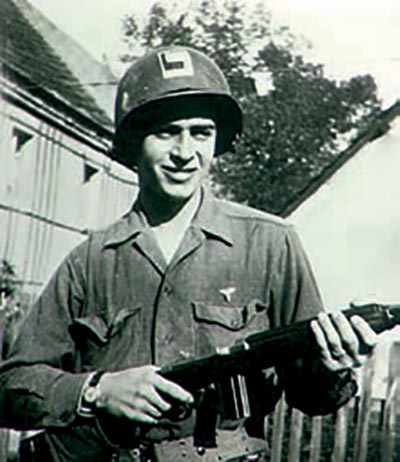
Glenn Felner
Glenn L. Felner was just 18 years old when he joined the Army during WWII. “There was an undercurrent that I recall that Jews don’t fight, that Jews are cowards. So, I had to make a statement…I wanted to prove that Jews do fight…and to get as close to the action as I possibly could,” said Felner of his enlistment, which led to a wartime experience that would see him awarded with the Combat Infantry Badge, the U.S. Bronze Star and the French Legion of Honor decoration.
Born in Chicago, Felner was the second youngest soldier in the 69th Infantry Division, fighting at the Battle of the Bulge in January 1945. On the way to Leipzig in April of that year, his unit came upon Buchenwald Concentration Camp, where, upon encountering Jewish prisoners, he understood for the first time what had been happening to Jews in Europe: “It is something I would not want to experience again…I can never forget the opening up of the gates of the concentration camp.” While passing out rations that he had hidden in his gas mask sack to liberated prisoners, Felner was stopped by a medic who told him that, because the survivors were so starved, feeding them would kill them if they ate too quickly. The memory of that experience over 75 years ago has led to his continued fight against antisemitism today: “The fact that antisemitism still prevails today is absolutely horrible, and it is important for us to speak up,” Felner stated.
One way in which he has chosen to fight is by sharing his experiences. Felner gave testimony to the Visual History Archive in May 1997, and he was recently included in USC Shoah Foundation’s award-winning documentary, Liberation Heroes: The Last Eyewitnesses. Felner stated, “It’s important that we share our experiences, so the present generation does not forget what their fathers and grandfathers went through, how horrible war can be, and of course never forget the Holocaust. I saw the consequences of both firsthand.”
Felner and his wife Bonnie proudly support USC Shoah Foundation and recently made a generous bequest to further its mission. “If I can help an organization like USC Shoah Foundation make a difference,” he said, “then I am honored to do so.”